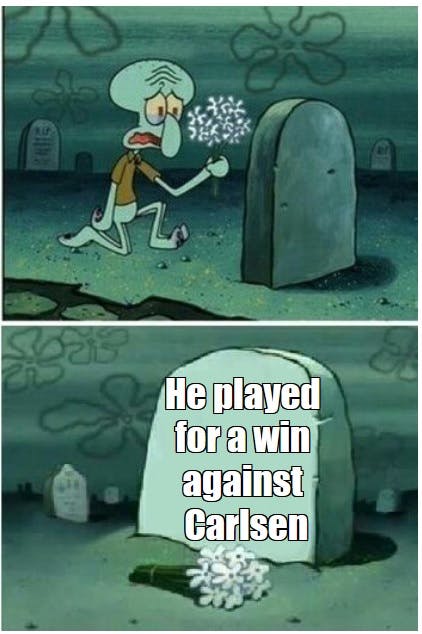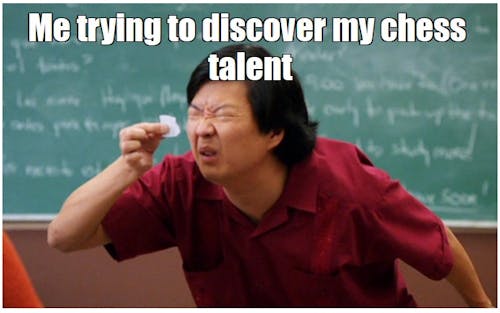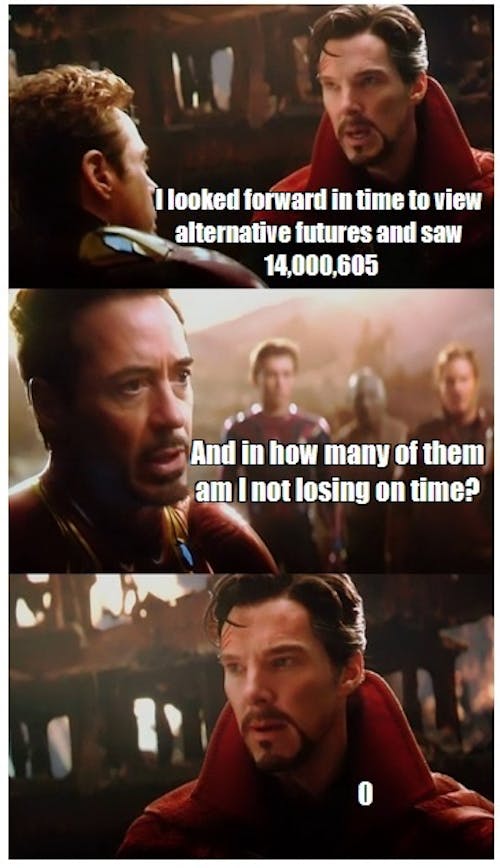Are you sure you want to delete your account?
(This will permanently delete all of your data - purchases, game scores, ratings, etc)
Change your username
Your current username is: guest
Change your account email address
Your current account email is:
Redeem your Fampay code here!
Use your Fampay code to get access to the Play Magnus Plus Membership!

Play for a Win in Every Game
What thoughts are running through your brain when you get paired against someone rated a few hundred points above yourself? Are you an “eternal student” type of person, meekly expecting to lose, but to get a free lesson in return? Or do you spend your evening before the round trying to find a drawish line for White which is supposed to help you earn a much-desired draw? If so, I believe you are hurting your chess future!
A true champion does his best to win every game. If he loses, he takes the medicine and learns the lesson. Players of a weaker spirit think in a different fashion. They rely on ratings and titles and start making calculations: “this guy is a GM, so a draw would be nice”; “that dude is 2200, so I have to beat him for my IM norm”. In fact, this shortcoming is typical even of average GMs, while only the very top guys have this ambition to excel and to take risks.
In 1988, Garry Kasparov was giving a simul to six promising US juniors. In one of the games, Daniel Edelman (2360) started repeating moves against his opponent with White, clearly hoping for a draw. Garry was disgusted and shocked by such behavior: "You have White; you have to play. That is my opinion, sorry. When I was young, I would never have missed a chance to play the World Champion." Kasparov offered Daniel a chance to continue the game, but in the end the conflict was settled, and a draw was agreed. Since I have never heard about Edelman, I decided to check out his chess bio. It turned out that the guy has “only” reached IM level and the rating peak of 2420 over the course of many years. Now that’s not what one expects when being a 2360-rated junior, right? However primadonnish Kasparov’s outrage has been, one can’t deny that he was right in the sense of discovering a glaring flaw in Daniel’s psychology. Judging by what we know about his further chess career, lack of fighting spirit probably wasn’t Edelman’s only problem in chess.
Unfortunately, all the videos of this accident seem to have been removed from YouTube. You can see the footage in the "American Gambit" (1989) documentary.
Some people think that if their opponent plays a beautiful game, it’s OK to lose. I don’t. You have to be merciless.
Magnus Carlsen
Great champions are well-known for dominating their contemporaries. When Kasparov was in his prime, quite a few other top GMs had this aura of hopelessness right from the start of the game when facing him. For most of them, even making a draw was considered a good result, and very few dared to dream about defeating Gazza. On a psychological level, this is not particularly surprising when you realize how devastating the scores of most super GMs were against the 13th World Champion. Here are some of Kasparov’s stats in classical chess against the world-class players of his era:
· 8 wins, 0 losses, 5 draws against Evgeny Bareev
· 15 wins, 0 losses, 14 draws against Alexei Shirov
· 9 wins, 0 losses, 8 draws against Boris Gelfand
· 7 wins, 0 losses, 2 draws against Judit Polgar
· 3 wins, 0 losses, 8 draws against Valery Salov
Similarly, people from Carlsen’s generation, +-5 years, seem to be utterly intimidated by him. This reminded me of a joke that a much older person, chess legend Vladimir Kramnik, made when he finished second in one of the tournaments, right behind Carlsen. He stated that he had essentially won the event since Carlsen was in a different league compared to others. And this revelation was coming from a man who whitewashed Kasparov in a WCC match! Unsurprisingly, a common belief these days is that Carlsen’s peers will probably not be able to wrestle the crown away from him unless he decides to walk away undefeated. In contrast, the young and upcoming chess prodigies don’t seem to idolize him as much as players of the older generations. Even though they are still considerably weaker that Magnus, you can see how passionate they are to show their best when facing him. No chickening out into a draw from most of them.
I am trying to beat the guy sitting across from me and trying to choose the moves that are most unpleasant for him and his style.
Magnus Carlsen
One may point out that the experience of the top players who face each other repeatedly in closed event is very much different from what most of us deal with. This is partially so, but the point still stands true. Besides, even if you play at the club level, you typically have your own “bosses” around, such as nemeses who keep crushing you over and over again in friendly blitz, or people who win the championship of your city year after year, and so on. If you want to overcome them one day, you should believe in your ability to give them a run for their money when you meet over the board.
I can’t count the times I have lagged seemingly hopelessly far behind, and nobody except myself thinks I can win. But I have pulled myself in from desperate [situations]. When you are behind there are two strategies – counter-attack or all men to the defenses. I’m good at finding the right balance between those.
Magnus Carlsen
Another related topic that comes to mind is the “every Russian schoolboy knows” advice to play solidly in an event where the caliber of opponents exceeds your out. Some old-school coaches believe that, especially when reaching GM or super GM level, you should first learn how to handle the pressure and to make draws, and only then aspire to beating the rating favorites. However, I believe this tip works best for people who are relatively faint-hearted and easily dismayed by losses. On a separate note, even some very top GMs have this “glass jaw” issue: if they suffer a painful defeat, they have trouble pulling themselves together. Also, this approach can be detrimental to the young talent’s development in the sense that they get used to 50% being a great result. Consequently, some of them grow up too cautious and not ambitious enough. And if the audience was applauding them for being able to hold their own against the chess elite at age 15, when they hit age 25 or 30, they still hug that coveted 50% mark, but the applauses are no longer there. In my opinion, people who want to unlock their potential fully shouldn’t be afraid to take risks or discouraged by losing streaks. If you can’t cope with a few losses in a row, you will probably not stick around for long in competitive chess anyway.
So far, we have mostly been discussing the psychological aspect of this issue. However, even in purely chess terms, it is much more preferable to play for a win than for a draw, not to mention feeling doomed and marking time before an unavoidable loss. Stronger chess players don’t like being pushed around, challenged. They enjoy being feared and love seeing the opponent naively try to exchange as many pieces as possible, usually making one small concession after another along the way. Then, when the underdogs reach a drawish or worse endgame, the favorites capitalize on their experience and grind it out rather effortlessly. I have seen this a gazillion times in my tournament practice.
While learning from other people’s mistakes is what we should all strive for, most of us learn the lesson better when it is a firsthand experience. For me the moment of truth was a game against an experienced candidate master rated 2200+. I was a kid back then and felt intimidated by the opponent’s rating and patronizing look. The fight fizzled out into an endgame where I was slightly better due to having a bishop pair (two bishops and a few pawns vs. his bishop and knight with some pawns). I was so proud of myself that I offered him a draw. This is the worst thing you can do in such a situation! The veteran gave me a stern look and played on. I felt insulted and disappointed and collapsed quickly, pushing pawns on the side where I was weaker, allowing him to create a passed pawn and eventually promote it. From that moment on, I have been going for the throat of any opponent, including top GMs when I was Black. And, I have to tell you, they didn’t like that, since when the opponent goes all-out against you, you can’t expect an easy walk in the park like the one I described above.
Self-confidence is very important. If you don’t think you can win, you will take cowardly decisions in the crucial moments, out of sheer respect for your opponent. You see the opportunity but also greater limitations than you should. I have always believed in what I do on the chessboard, even when I had no objective reason to. It is better to overestimate your prospects than underestimate them.
Magnus Carlsen
Let go of your fears!
Bottom line: I suggest you put up a fight in every game. You will enjoy chess more this way, and opponents will be afraid of you, even if they are higher rated. However, of course, playing for a win doesn’t imply being reckless or pressing the position too much when it doesn’t allow it. Also, there are certain situations when a quick draw is useful, for instance, when you are ill. Still, the “play for a win in every game” rule applies to most situations in chess.
The Play Magnus app does have an “offer draw” feature. However, when you challenge Magnus Carlsen, Judit Polgar, Wesley So or other character there, I highly recommend that you do your best to knock them out!

